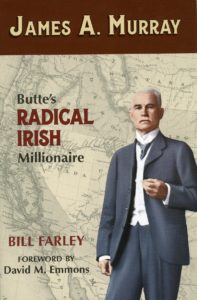
Author Bill Farley offers a fascinating look at James A. Murray, a largely unheralded early Montana magnate, who had a reputation even as a child as “both troublemaker and saint.”
In his own version of the story, complex Irishman Murray first shows up in America as a scrappy 8-year-old escaping a prison ship bound for Australia by jumping off in Nova Scotia. Whether myth or fact, it sets the stage for this portrayal of the author’s third great uncle – a man who was at once canny, sly, crafty and tight-fisted, as well as anonymously generous and humble.
Farley fleshes out the Irishman through years of research and skillful writing, making every effort to give an accurate sense of this iconoclastic buccaneer and accomplished capitalist.
Murray hit “pay dirt” in the tiny mining town of Pioneer, and parleyed his proceeds into saloons, stores, real estate and more mines in the still Wild West. While his access to cash nearly rivaled that of Copper King W.A. Clark, the two differed drastically when it came to politics.
According to Farley, Murray’s radicalism was molded by a “sacred duty to Ireland, in part from the connections he made with fellow pioneers in early mining camps, and in part from his disdain for corporate capitalism.”
Murray’s own motto is also telling: “He who never made an enemy is not worth having as a friend.”
This book is a must for those interested in Montana history, especially its early years. It also explores other areas that drew Murray’s largesse and investments, including the artsy community of Monterrey, CA, Salt Lake City, Pocatello and New York City, where he was known as “Pearl Jim.” The story wraps up with the bitter dispute over his massive estate.
Farley includes an insightful foreword by notable historian David Emmons, a professor of history at the University of Montana. Photos, maps and illustrations, an appendix of poetry, contemporaneous tributes to Murray, a list of loans, a family tree, end notes and a bibliography mark this as a scholarly resource.
– CK Willis